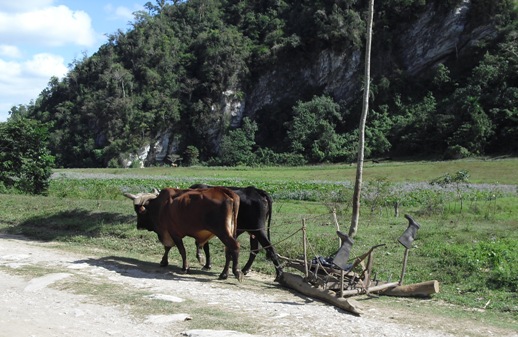The title more or less says it all, we can adjust [the talk to meet] your interests, comrades, when it’s time for discussion. I am going to talk – although the topic is to talk about the whole strategy against Cuba and how this strategy has been articulated in counterrevolutionary campaigns – we are going to focus now on the newest components of this strategy. And in the second part, without any kind of limitation – I don’t know how much time is available, I am going to try to be as brief as possible – we can discuss later the rest of the topics that interest you, and are most relevant to the current operative situation, we can talk about the counterrevolution, [Guillermo] Fariñas, Los Aldeanos [a rap group], of those we’ve already talked about out there, but it seems to me that all this is very interesting, perhaps the most important at the current time, is to talk about these subjects.
We are not fighting the new technologies
Some comrades have already heard me talk about these subjects before. In reality I have become quite insistent about these issues because this is the base, comrades, the rest of the actions that are developing around Cuba. That is, if we don’t understand the psychology the enemy is working with, we will see the rest of the things as isolated events, as isolated components, simply as things that happened and we won’t be capable of understanding the time and the role played by each of the enemy’s strategy.
So in the first part I’m going to talk about how this aggression against Cuba is articulated, in a general sense, in a global sense, and what is the role that is attributed to these new technologies. Just a note because we’re going to get into the content: we are not fighting these with new technologies; it’s simply to know them, to use them to support our interests, and to know what the enemy wants to do is to put them in the country. Because sometimes we are fighting them because they crash the computer because we’re fighting with the technology, no, the technology in itself is not a threat, the threat is what someone does or could do from behind this technology, in the same way it is an opportunity because of what we are able to do with it.
So with that preamble let’s get started.
There is a group of antecedents we want to talk about, because until 2007 the blockade was closed, didn’t have… the only crack was in the sale of food. However, in 2008, we began to see a public group in the Bush administration, some of them reflected there [see PowerPoint (PPT) screen], that is, in the Miami Herald, they talked about some of them in the Los Angeles Times, Bush himself announced an offer to award licenses to provide computers and internet access to the people of Cuba. And so there is a group of declarations from the Bush administration that, at that time, we are talking about something a little counterproductive, that is, it wasn’t playing with the strategy that had been followed, with a group of components that we were seeing in the operative work of the introduction of those media by some determined groups within society. We’re talking about the counterrevolution: the bloggers who were starting to emerge as a new category – and let’s talk about that for a bit right now – and I put this antecedent because 2008 will be a benchmark of what we will discuss later, that is we’ll talk later about why Bush was already talking about these things in this year.
Obama is worse than Bush
2008 comes and a change of administration, the “embrace of death,” and I like to say, between Bush and Obama, comes the great dream of a world of change and in the end life has shown that it’s nothing more than a chimera: Obama is a man who is the fruit of his own system, what the American system was lacking, a man like Obama who was helping to clean up the image of the atrocities of Bush, but Obama is… not more of the same. continue reading
That is, we’re talking about a man who in his government, for whatever condition – we’re not going to detail now if it’s more this or more that – the military budget has grown, the number of men under arms in different countries in the world has grown, the plans against Cuban haven’t changed, nothing is reduced, on the contrary, covert actions in particular have increased, and then we’re going to see Obama give a speech about the new technologies as well, a little more intelligent.
Obama talks about measures, and the measures come out in April, fine, he announces them in April of the previous year, before the Summit of the Americas – he was cleaning up the stage where he was going to go – and finally they materialize at the and of last year in a document, but they talk about [reads the PPT on the screen] authorizing the telecommunications providers to establish telecommunications and fiber optics in Cuba, talk about authorizing the telecommunications service providers to make agreements with Cuban entities, talk about awarding licenses for the provision of radio and television signals to Cuba, and talk about awarding licenses to people “subject to the jurisdiction of the U.S.” [i.e. U.S citizens or legal residents] to activate and pay for U.S. and third country suppliers of any telecommunications service, satellite radio and television, that they were ready to provide to Cuban citizens.
Networks in Havana neighborhoods
What is the reality behind all of this? We are going to talk to you about how we perceive this strategy in four fundamental components. First, there are a group of plans, and today we’re just going to talk about two of them—it would take too long to talk about all of them, and besides, many are already in progress and there are already various operations dealing with them. We’re going to talk about four components that demonstrate why we want to do all this, that is, where we are going with the strategy for all this.
In the first place, [reading from Power Point slide] the access to computers and telecommunications in order to establish wireless networks throughout the country with the activation of illegal internet access points. What do we mean by this? Well, there are a group of programs aimed at creating networks throughout the country that provide direct internet connection. What is the first point of this program? It is to study the networks we already have in Cuba. In other words, they have already carried out a meticulous study of the wireless networks we have in Cuba. Sometimes we live a little…and I say little because sometimes you chat with various comrades and they look at you with a certain face [makes gesture of incredulity]…no.
For example, in Havana there are thousands of wireless computers connected in any neighborhood, from Playa to San Miguel del Padron. These are kids who connect online to play virtual soccer, to play those shooting games, as well as university students who connect to study among themselves. Basically, wherever there are at least three computers with wireless ports and Wi-Fi, we can see that it’s a little device, and through it, a wireless network is created. And besides, it’s not illegal. So, a wireless network between my house and the apartment next door is not illegal. As long as I am not providing a service it’s not illegal. Well, they’ve studied how wireless networks function throughout the capital. Or at least they tried to study this. Based on this, they formed two projects which we will talk to you about here.
The first of the projects belongs to the International Republican Institute [IRI]. The program is called “Accelerating the Transition to Democracy in Cuba” and has set a framework of initial action from 2008 to 2010. We must pay close attention to the date of 2008. That year, there was already a discourse on behalf of the American government attempting to justify what they were about to do behind the scenes.
This is their website which details their entire program, the democratic transition in Cuba and how they plan to go about it. But it does not mention what we are about to see here right now, which, shall we say is the operational component, or the secret component of the program. The first of their objectives – there are three we aren’t going to talk about today – talks about [starts reading off Power Point slide] developing and creating conditions for internet communications in Cuba. And I’m going to have to pause here.
What is a BGAN satellite unit? Later on we’ll see it, and I brought a drawing here that more or less illustrates it. We’re talking about a small device [makes a hand gesture] that allows for a high-speed internet connection via satellite. It allows for “voice over IP”, or in other words, it allows a person to talk directly on the phone, and to be able to see videos. We’re talking about high performance equipment which does not need a roof antenna, which does not need a cable to hook up to the device (the entire connection can be wireless), and which means I don’t have to put it in the window pointing towards the Habana Libre Hotel. Instead, wherever I decide to put it in my house I can stay connected. What we’re talking about is a technology that is present in the zone of the Americas in 2008. So, in other words, it’s the latest satellite communication technology, and completely portable of course.
Being a blogger is not a bad thing
Here, they are talking about distributing [looks at and points to the Power Point] a group of BGAN satellite units to dissidents (the traditional counter-revolutionaries), and bloggers. And there’s something I must bring to your attention because it is precisely at this point where they start manipulating our language. The bloggers establish themselves here as if they are a new category, that is, they are people who have blogs, who run their own blogs on the internet; if we leave it to the enemy we are going to have the bloggers, just like we have the concept of civil society at a given point, just like we have the concept of democracy, and very soon we will have a department to work with the bloggers.
That is, being a blogger is not a bad thing. However, they are already presenting them as part of the same counter-revolutionary group as one more category that can oppose the revolution, and this is a subject and a term that we can’t accept. That is, they have their bloggers and we will have ours. And we’re going to battle to see which group is stronger. We will talk more in depth about this later on.
Anyway, the idea, comrades, is to distribute this equipment and to establish national networks, and they want to supply members of these networks with cell phones with text messaging service. The modules we’ve operatively detected have mostly been high-performance Blackberry phones with satellite connectivity, which is paid for outside of Cuba, so they do not depend on our networks, nor do they pass through our supervision mechanisms.
And of course they pay for this service, and they send emissaries to contact and finance these networks, which are made up of about 5 to 10 members (later I will explain why). They train them, establish and maintain contact with them from the outside, and they have to activate the networks of technology businesses in Cuba. But what are networks of businesses? All of this sounds very sophisticated, doesn’t it?
They are computer-savvy technicians that we all know in the neighborhood. You know, the guy down the street who fixes computers. I’m somewhat computer-savvy. When my neighbor’s computer breaks I go over and try to fix it for him, and I help him out if he wants to install a program. Those “technological businessmen” are no more than these kinds of people. So, they look for people, usually young, who are interested in fixing computers. They then recruit them and have them on their side over there.
And what will these people do for them? They will maintain the networks. In other words, they count on certain people they can pay, and in turn, those people guarantee things for them, like, “Hey, fix this for me. Install that program for me, etc.” They work together with these people in order to benefit themselves. Recruit. And that’s the exact word they actually use, to recruit citizens who are not American in order to evaluate the use of cellular technology in Cuba, in this study that they are doing, of the cellular and wireless networks in Cuba.
Why in a third country? Because this BGAN equipment functions with a small internal card, just like cell phones, but the service provider is not in Cuba. The Inmarsat service is only found in countries that have contracts with Inmarsat. Cuba has contracted Inmarsat service, but Cuba does not provide Inmarsat service. So it must be done from a third country. In our case, we have sources who indicate that it could be coming from Costa Rica. Perhaps later in the presentation we can talk about Costa Rica because it is a country that keeps coming up when it comes to subversive activities against Cuba.
Internet connections everywhere
Just quickly and trying to be clear: What is the idea? That is, to put in place — don’t be fooled by the drawing, the BGAN is not an aerial and it doesn’t transmit signals like an aerial, it’s linear transmission, which makes it more difficult to keep under surveillance — and set up the IRI project in different parts of the country. At first we’re talking only about 10 points, around wireless networks which already existed and would allow, without filtering the IP’s, that is, when I come and set up all the machines in the area without a WiFi port they can connect to the Internet through me.
Basic social psychology, comrades: if you’re at home, sitting in front of your laptop, and a message pops up saying you’re connected to the Internet, the last thing you’re going to do is ask where it came from. What I can guarantee is that before it goes down, people are going to start to log on, search, surf, download videos, it’s obvious.
Let someone come here or anywhere else and say, “Hey, I’m getting on the Internet for free! How is that possible?” and that is part of the psychology that they’re banking on to get this going without too many setbacks. What’s the idea? That is, this thing here [points at the screen] on the right, blue and black, is the WiFi network transmitter. You can have a network and with this transmitter you’ve got a range, that is a communication, with the computer that’s here, depending on where the transmitter is, a half a mile to a mile, that is we’re talking about an area of a half mile to a mile we can connect 25-30 machines, which are connected together, and I come with this device [the WiFi] and the whole network is connected to the Internet through me. There are many useful possibilities.
We will be able to connect through high-speed, if any of us has for whatever reason a home connection, you know that the Infomed server is the best, at 56 k, if you are near a telephone hub. But if you live, like I do, in San Miguel del Padrón, the day you get it at 33 k is a good day.
Then through here, you will get a much faster connection, more comfortable, and you won’t ask yourself where it’s coming from; but if we put ourselves in the enemy’s place, it also gives us the confidence that any intelligence transmission of any kind, I don’t know, sitting there on that corner, I can open my laptop and have a secure connection which the Cuban authorities cannot control. And that is the second part we are adding to this issue.
What does a BGAN module bring, that is, this thing they are distributing in Cuba? What does it include? It comes with a video camera, five Blackberries (five, because remember the network was for 5-10 people, and the minimum is 5), a Notebook—which is a very small computer that guarantees the connection—the BGAN itself and that’s it: we’re on the Internet. This is what they are intending to distribute for free, so nicely, these people in the country.
Alan Gross came to knock down the Revolution
There is a second project that follows the same line. This man we have up there is Alan Philip Gross, an American who is a prisoner in Cuba, a mercenary — now we can’t say ‘mercenary’, in modern discussion he is a ‘contractor’, those are the terms of modern language — for the DAI, Development Alternative Initiative, that is, an agency subcontracted by the USAID to create subversion in Cuba.
Comrades, since I was a little boy, those whom they pay to fight, to battle in a foreign land, that is a mercenary. And that is what this man is doing. The very same as in Playa Girón [the Bay of Pigs invasion in 1961], but this guy came with other arms. He didn’t come on a boat and didn’t disembark with a gun in his hand, but it’s the same story.
This man comes to Cuba, he is following the same line more or less, I mean more or less, this is a case that is in the criminal process at this moment, pending a trial, and he is detained. For the next act, the protests will start, hey, they took my guy, I have a man who is a prisoner, and this document comes out from the director of the DAI [U.S. Defense Intelligence Agency] on 14 December 2009, he [Gross] was detained since the 3rd, his arrest was made public the 4th, where he recognizes — the director of the DAI — hey, this man isn’t a spy, my guy isn’t with the CIA, he’s one of my guys who was there because I have a contract with the USAID, which means DAI has a contract with USAID, to plan a contingency and democracy program in Cuba, to help the American government to implement activities in support of the law, human rights, political competition, the construction of consensus, to strengthen civil society in support of a democratic government in Cuba.
This means he isn’t a CIA guy, no, no, he’s a guy who I sent under a contract to Cuba to knock down the Revolution. Because when one reads the concept that the DAI made public of why this man was in Cuba, this man was in Cuba to change the political system in Cuba. However, he comes out with this defense argument.
They know that this is a setback of giant scale and 48 hours later this letter disappeared. Today on the internet this letter doesn’t exist and you go to the DAI’s website, look over the site map, and this letter never existed. What’s happening? Like always, one eye is looking at you, on the internet someone is always recording you. And what you put up one day, although you took it down within 10 minutes, that stays recorded somewhere. And in this case we have the document, which we have managed to preserve until now.
The danger to young people
What did Alan Gross come to Cuba to do? The same thing the IRI project is trying to do, like all the other many projects. We believe that this will be supplemented with these ten little devices that IRI would place. There are 10 from IRI, another ten Alan Gross could place, another 10 that others could place… the idea is to undermine the territory of this story… The idea is, as we said at the beginning, to create a technology platform outside the control of Cuban authorities, that would permit in some way the free flow of information between Cuban citizens — not any Cuban citizen, those selected by them, that is opponents, bloggers, those they have chosen — and between those citizens and the world.
This is the first time. But it comes with a second part in the strategy. In parallel, it is articulating and organizing a virtual network of mercenaries, of counterrevolutionaries, who are not the traditional counterrevolutionaries. Who are we talking about. Martha Beatriz [Roque], you say Martha Beatriz in Cuba and everyone distances themselves from her; you say Elizardo Sánchez, Vladimiro Roca, and everyone identifies them as the enemy.
But we’re talking about young people, people who may have an appealing spiel, guys who live with our children, our brothers and can seem like normal people, but they may have a spiel from the networks.
It’s no longer Darsi Ferrer [Cuban dissident doctor] from the park on Calzada [in Vedado] protesting, no, the park of the protest here is the internet. From the network we are generating our own conflicts.
The most notable example — it already bores me to talk about her — is the case of Yoani Sánchez. I say the most notable because she is a great fabrication. And it’s a great fabrication where a girl from nowhere is turned into the most important journalist in the world, [among] the ten most important personalities in Latin America, Ortega y Gasset [the country’s largest prize for journalism] prize winner in Spain, Maria Cabot Prize from Columbia University [U.S.], that is in two years she’s turned into a great character, from nothing more than the result of a money laundering operation.
The drug money, you wash it so no one knows where it came from. The money from subversion you wash through prizes so no one can say that the U.S. government gives Yoani money. No, the money comes from the prizes. We’re talking here about prizes of 15,000 euros, 50,000 euros, that is the money out there. Then, the great construction is Yoani.
Anyway, you don’t have to be afraid of Yoani. Yoani kills only herself, in fact she’s already committing suicide. She says in the interview [with] Salim Lamrani [French blogger] — I assume most of you have read and if not I recommend you read it several times — she says Salim manipulates her because at the end of the interview Salim Lamrani stands up and she hugs and kisses him very warmly.
I mean, of course, if you are a journalist. If you weren’t, and he was, the journalist who managed as good an interview as any that will be awarded prizes in the whole world, the best interview of Salim Lamrani’s life, and you gave it to him, you gave him the opportunity to wipe the floor with the construction of the Americans. And he did.
Behind Yoani Sanchez
The great example in the whole story is Yoani, but not only Yoani: Behind her there is a grand strategy involving coordination of the social networks. Very briefly — the topic today is social networks — I recommend the intranet [the Cuba government’s own internal-only network] to you, and there is already an explanation of social networks there which, unfortunately for you, I gave myself, so you’ll have to see me again, and Thursday we are going to have a second explanation, not from the point of view of the activities of the enemy, but from how social networks are operating in the country, which Rosa Miriam Elizalde will give, and I think Friday or Saturday the second conference will be on the Intranet.
With these two we can get a general idea of what social networks are, but all this we have heard talk of: Twitter, Facebook, YouTube — the video network You Tube more or less the whole world knows about it — Flickr, which is a photo network, that is a network where people don’t go physically but through the web. And the networks are very broad, like Facebook. In Facebook any one of us — and we can test it — can create, speaking the language of youth, even the ones who consider themselves “less popular,, can enter, put in a set of your actual data, and in ten minutes it will return to you links to all your classmates from school, or whomever is in the social network.
You put in: “I studied at Saul Delgado [high school] in this year and I graduated in this year,” and in ten minutes they say “Look,” and you can see all the people you know: Joe Blow, two years younger than you, two years older than you, but one of those guys from Saul Delagado in Vedado,” and from there the network begins to develop.
And they begin to use — they no, we use, because we are also part of the social networks and we are using the values that are the traditional values when human networks form: family in common, common interests, common history, these are what are most used in the Facebook networks, that is, the strongest links to people, especially in our case the schools link us strongly, the years in junior high, high school, and from there we began to link ourselves. And they try to break the ideological barriers on the part of these linked generations. And then the graduates of Saul Delagado, the graduates of Lenin, are, more than any ideology, graduates of that school where we spent our best times. And from there, these relationships begin to be articulated.
We have to fight On Twitter
These are networks of more than a personal nature, but you will find another like Twitter, which is a classic combat network. Twitter is a network of short messages — we’ll put up a couple of short examples here — which is a network where there is constantly a battle. They have their battle and we, we have ours.
But the idea is to create this supposed counterrevolution on the networks and act against Cuba. When one looks retrospectively at what happened with the Orange Revolution [in the Ukraine in 2004], what happened with the Iranian Green Revolution [in 2009], what happened after the Iranian elections, it was this, to say, the world there was going normally, but through these networks they succeeded — those people they already had prepared there — to mobilize a group of people, launch them in the street and report about it through those same social networks. Today any telephone has a camera, any telephone has video, anyone can subscribe to YouTube from that same telephone across the internet — in our case we don’t have this service controlled, but we do have BGAN, the computer and access without control — there it is.
It’s all a strategy: if I put the technology platform [in front of you], the people who can generate the conflict for you and at the same time those who are going to report this very conflict abroad. Why is this in Cuba, which at times we think we are immune to this — when we say we think what are our own comrades? As we have had our own institutional limitations as part of our functions [in the Ministry of the Interior], we believe that society also has them.
Those who are on the right [pointing at the screen] are the web sites most visited on the internet in the world. This is about 15 days worth of data. There we see Google, Facebook … those in yellow are social networks; those in red are blog platforms. And the rest are search engines, in one form or another. In Cuba we are at the same level as the rest of the world.
At times we think that in terms of internet access we are lower, no, no, the trend in navigation is the same as in the rest of the world. The first place we see in Cuba is Google. The social network seen the most in Cuba, which is also in 4th place of the places most visited in Cuba is Facebook, which is the second in the world.
YouTube is among the social networks seen the most. Twitter, is in 9th place for us, worldwide it’s in 11th place. This is to say that there is a relationship between how the world moves on the internet and how we move. As such, we should be convinced, comrades, that the formula, the mathematics, the psychology that works over the internet [works on] Cuban internauts the same as on Chinese, as on Brazilians, and on Bolivians.
Because we sometimes have the tendency to think, among our comrades, that no, here people are going to search more on Google, than if we put ourselves on Wikipedia for our youths’ homework, no, no, that is a component of those who are already a little more advanced in age. For our young people, who are those who navigate the internet the most, they have the same trends as everyone else.
A spark to generate conflict
This is what I am showing you—I won’t ask you to understand it, but to inform yourselves on how Twitter works, if you have the access—these are the profiles of four people on Twitter. Twitter is a network for short messages, 140 characters, and there we find Yoani. Twitter works in such a way that I follow You, and You follow Me. That is: I follow people, people follow me.
Whatever people I follow reach me, and the people that follow me, whatever I write reaches them. According to Yoani’s profile on Twitter—this is from today at 1:30 PM—she has 52,946 people following her on Twitter. Each time Yoani says anything, at least 52,000 people in the world get the message.
But to each of these 52,000 followers that she has, the message will reach them, and it’s like a spider that threads a web, and sometimes we say: Why is it anything Yoani says, someone who is nobody here, the whole world knows about it? That’s one of the explanations. This is a method of diffusion in real time.
And there you will see some of the things Yoani said today: “It’s time to organize the first quedada or twit up for the island’s tweeters. The question is where and when?” What are we talking about here? The same thing I was explaining a while ago in Iran. To say “Tweeters, rise, let’s do it, let’s go… let’s meet at…” and so that is how she is going to set off the spark to start a conflict.
And like that you’ll see—as an update on Fariñas’ hunger strike: “Fariñas is on hunger strike since June 1st [sic] and has been taken to the emergency room,” being re-tweeted as text messages. “I am reading the Manual, and I think from this will emerge many ideas for alternative Cuban twittosphere publishing.” In other words, I am talking about very concrete things, very short, but messages that always carry an ideological component.
Next to Yoani, I have placed another one of the bad guys, the Twitter of Penúltimos Días, this from a Cuban [Ernesto Hernández Busto] who lives in Barcelona, the person who was with Bush at a cyber-dissidence event last month; Bush organized an event with that name, Cyber-Dissidence, and invited an Iranian, a Colombian, a Sudanese [EHB has clarified there was no Sudanese at the event]…someone else… and a Cuban.
The Cuban guy, of course, was not from here, but from Barcelona, and he even says he feels proud of being financed by Bush and of working… There’s a fabulous photo that shows him in an embrace with Bush. But, equally so, it’s about constant messages of aggression against the Revolution.
The internet is the field of battle
And, of course, we have our own twitterers. The network of Cuban twitterers is growing, and already starts to have a certain strength. Here we have Yohandry Fontana, who is the most recognized twitterer among revolutionaries, Yohandry’s blog is a strong blog, strong enough that now they are applying a formula to discredit it: You look for Yohandry on Twitter and it’s not him. There’s the same avatar, the same logotype, the same name, but it’s another person writing the tweets, you realize it is someone very very counterrevolutionary. Then you have to go to Yohandry’s blog and from the blog he posts the tweets, it’s all the tools of a plot.
They are doing the same thing to Chávez and I’ll explain why. If you search for Hugo Chávez’s blog online and if you put it in the search engines it doesn’t appear. They have…[sentence not completed], because what is being done to the blogosphere is very forceful. And here I have Tina Modotti, of course Tina Modotti is not Tina Modotti, it’s a person behind the image of Tina Modotti, and she, comrades, is the one who whips Yoani. She doesn’t let Yoani live. If Yoani says white, this one says black and explains why it’s black.
Well, there what happens is that she is opening fire on Laura Pollan [leader of the Ladies in White]. “Yoani Sanchez is out of competition,” and they tell Yoani, “Take it or leave it, last chance to make a buck here,” and that’s how it happens. This, comrades, is something you must live for yourself. It’s very difficult to explain. It’s a dynamic of permanent combat, and we cannot lose the perspective that the internet is the battlefield, and that the enemy has their troops ready. We cannot step off the battlefield; we must enter the field with the strength and knowledge of our people so we can fight.
An example of this? It’s Chávez’s Twitter. Chávez goes on Twitter, I say that Chávez doesn’t look like anyone — the image [on the screen] is a little old, it wasn’t put up today, now let’s see today. Here he had 326,000 followers, Chávez already has on the order of 470 and some thousand. Chávez says that he doesn’t follow any more than five people: Fidel Castro — the reflections of Fidel are on Twitter, Correo del Orinoco — which is one of their magazines, the Socialist Party of Venezuela, Tarek [El Assaimi, minister of the interior], and another one of the government ministers.
He doesn’t follow anyone else, but Chávez is Chávez, he can give himself this luxury, and he has almost half a million followers. And Chávez has been moving Twitter. What happens to Chávez with Twitter? What generates so many followers that he has to divert those followers to a space where he has more capacity to respond: 500,000 people following the messages of a single person doesn’t give you time to read them, even if you pull one a day. So this was a little out of hand and here we see the solution.
This is an example of how Twitter works. Until the day Chávez joined, the Reflections of the Commander-in-Chief [Fidel], which is the Twitter of the reflections — as you will see, the central ideas of the reflections are posted there — had close to 6,000 followers. After Chávez joined, it’s gone to more than 30,000. What do I want to tell you? The people who were watching Chávez and they saw that he followed Fidel, they were people who then started to follow Fidel. People who didn’t know that [Fidel’s Twitter account] existed started to follow him, and this is the fundamental logic of social networks.
I see that you follow a guy and I follow that guy, and when I see that guy follows another, I begin to interact with more people. This is the blog [sic] Chávez today. I emphasize that Chávez doesn’t seem like anyone. There you have it, this is the data from today before I left to come here, at 1:31: 547,390 followers on Twitter. But, what has Chávez done?
Read here: People ask Chávez on Twitter for houses. It says, “My roof fell in.” And Chávez through Twitter says to his ministers, look here, from bottom to top [pointing at the screen], the second is a person who is saying, “Hi President, forgive my message, I need your help to repair my mother’s roof.”
Chávez’s answer: “Urgent, Tarek.” And this is an order to Tarek to resolve this problem. What happens, Chávez announced that from the dynamic of this code, he’s already got a team of 200 people to respond to all these problems. What has he done? Created a system of exchange, but in Venezuela now SEBIN [Bolivarian Intelligence Services], the former DISIP [Police Intelligence Services Directorate], set up a Twitter through which people could denounce enemy activity.
And you should see the flow they have. Of course, half of what comes to them isn’t real, but interesting information is emerging. That, comrades, is what they mean to say that this is a tool that even though it was created by the enemy, we must also use it to fight.
An important component in this is socializing. These are platforms you don’t pay for access to, they are free. You have to have your internet connection, but they are free. What happens? When you do something like what Chávez is doing, you have your command back.
In fact, Twitter is not made to solve social problems. What’s happening? I emphasize, Chávez doesn’t look like anyone and he has made a revolution with this, to the point where I’m now telling you, now they no longer know what to do with him. They already don’t put him on the search engines, you won’t find Chávez there, but it doesn’t matter, it keeps flowing like out of the mouth of a cannon. So, it’s something we have to follow.
What I can guarantee you is — because there is also a psychology of this — if you don’t react, you shut down the plant. And it’s not that you shut it down, there’s a level of reaction and a level of response, because every day there are more and more signing up.
Twitter has a formula like the blogs: If you don’t write in a blog for three days, no one will come to see it. In a blog, you have to write at least every 48 hours; when you enter a place and there’s no activity, you don’t return. So this is really an efficient operation.
Organizations with a new face
The third component of how we see the strategy being implemented today in Cuba: The creation of a group of organizations that are different from the ones we’re used to seeing. It is no longer the Cuban American [National] Foundation (FNCA, in Spanish), no. They are there, but these do not resemble FNCA nor the Council for the Liberation of Cuba, Alpha 66—all those we know as counterrevolutionary terrorism. No, now they appear with names a little more interesting: CubaVibra, [Cuba Vibes] on the web, of course; Raíces de Esperanza [Roots of Hope]; Red Hispánica [Hispanic Web].
I emphasize these names to you, because they are names that we will be hearing about soon in various scenarios. What are they about? They are the organizations founded by the children of Cuban-Americans in the US.
What is their discourse? “I am not my dad, I did not leave Cuba, I was born here and I want to reconnect with my roots. And my roots are the same as yours, you are my same age, and you are there. It doesn’t matter to me if you’re part of the Juventud [Union of Young Communists] or if you are part of the Party [Communist Party] or if you go to Lenin [School for the children of Party higher ups] or University of Havana; I want to connect with you.”
“Let’s talk young person to young person, professional to professional.” And with these dynamics they try to give the US Cuban community a new face with which to engage with their counterparts, our nation’s youth.
As examples, comrades, to cite two very simple ones: when you enter CubaVibra’s homepage—CubaVibra has a social network, which is, they say, for ex-alumni from the Lenin [School]—you see the page divided in three chapters: people still studying at Lenin, those who graduated and left, and those who graduated and stayed.
You can take it or leave it. You read along and realize that the level of manipulation in it is terrifying. But if you enter with naiveté, you fall in their trap, and you go along.
The first news I had about the disaster of the Math tests [from the 2009-2010 pre college level final test] I found through them. Because the kids would come out of the test and go straight in there to post “They’re finished with us, they don’t want us to go to university, this is a crime,” because it’s already become… before, you’d sit at the park and chat. Now, it’s sitting at the computer to tell others what you are going through. That is CubaVibra.
We grab the ball, fire it up…
Roots of Hope is the organization that was behind the Juanes concert [Havana, September 2009]. They tried to damage us with the Juanes concert because they still don’t get how we work here: we grab that ball, fire it up, and turn it back on them again….
But, well; after all the racket generated, and many surely saw the videos of Juanes and the other one [Miguel Bosé,] it was nothing but—they only played that small segment—a string pulled by the Roots of Hope people, who—when they realized they had been caught—went to Juanes and said: “Hey, this is fucked-up. These people know where we’re going and we must cancel the concert.” Which didn’t amount to anything, because the concert went on and it was a huge success.
Lastly—we can’t leave it out, because it has an important ideological component—there’s the topic of the scholarships. That is, the creation of scholarship programs for Cuban students to go to study in the US.
Not to study Agriculture, or for our youth to learn how to produce a transgenic corncob that will feed Cuban people better, or—as a comrade used to say—a scholarship “for our agronomists to learn how to turn a pig into a cow…” No, no: They are “leadership scholarships.”
What do they think they can teach us about leadership, when we have the best leadership school right here? Here any Cuban, wherever you put him, stands up and gives a speech, or quotes the Commander-in-Chief as a reference so no one can disagree, but he will also convince you to buy hot water and drink it up. And then, they want to develop leadership in our youth, young people with leadership capabilities. These scholarships came along through a rather messed-up course at SINA [US Interest Section – the substitute for an embassy, as Cuba and US don’t have diplomatic relations]. There wasn’t good management with the kids even after the scholarships had been granted.
The decision was not to allow them to travel [out of the country]. There is an official from SINA who said this was one of the best ideas these people had come up with, because if kids left and came back, there was a gain for them because they had formed someone under their ideology and had planted him back here. Or, if the kids left and stayed there, it was also a gain for them because they now had a talented person they themselves had chosen. If Cuba didn’t let them go, he said, that was also a gain for them, because then they had accomplished creating a mess for us to deal with; in other words, this was a gain-gain situation anyway you looked at it.
The solution? They were not allowed to go. And what are they doing? They put up a third container box at SINA—there are two already for Internet access so the Counterrevolution can write up the news, or not really write; just appear to do so, because mostly it is already written, so it’s really for them to send out the news. Now they have a third one with tremendous Internet capability so these kids who couldn’t go to the US can still take the courses here in Cuba.
In other words: they saved the airfare money, they now just sit the kid in the cubicle and, through the Internet, video-conferences and televised-courses are given—we had already invented televised-courses, a long time ago, but now they are giving them to us as ‘leadership’ and developing our young people right here.
Forming the leaders of the future
This is a component which, looking at the four previous points carefully, closes the circle a little. That is, and summarizing:
- The creation of a technological platform
- The formation of the opposition, of the counterrevolution, through those networks
- The establishment of a good image, nice people from abroad, who will make it attractive for the youngsters here to start a dialog. Imagine: if a CubaVibra person comes up and says “I am giving you a free laptop, and a cellphone, no charge,” that cannot be a bad thing, can it? How can we then tell the kid that guy is a bad guy? He’ll say “Hey, he didn’t ask me to do anything with this, he only gave it to me.” So that makes everything very complicated for us.
- And, lastly, by forming the leaders of this new youth, they are creating the people who will direct that agenda.
What I am telling you next was good until yesterday, because today there is new information. These, comrades, are the funds that have been approved for 2010 [a chart pops-up on the screen]. Bear in mind the program was 2008-2010. These are the funds the USAID will pay from 2010 on. An article today from the Miami Herald claims that, of these $20 million, all of it has already been released and will soon be distributed, except for the funds for the DAI organization. The DAI is Alan Gross, who is in prison here. So that money won’t go, because it seems they were doing something bad and their man is now in jail in Cuba. They found this out because we took their man and jailed him, the guy was doing something he shouldn’t. So they have frozen those funds until they know what will happen with their man.
Let’s take a brief look at these funds. In 2010, for human rights, there was only $1.5 million. Why do I say “only”? Up until three years ago—2008—most of the USAID funds would go to those small groups, under this chapter of human rights. This year, they get only $1.5 million. Why? Because $16 million now goes to this story we have been talking about here. That is, $16 million goes to new technologies, networks for Cuban and civil society. For example, the IRI, which was to distribute 10 BGAN, from now on has $1.5 million more. For what? To expand their networks, those networks that according to them they were creating. To give them more wings.
Freedom House, $900 thousand for artists, musicians, bloggers… I want to emphasize the idea that they want to create the concept in our heads that bloggers is a category of enemies of the Revolution. If we get into a war with bloggers, then we would have a serious enemy, because in the press alone we have nearly a thousand bloggers in Cuba—journalists, revolutionaries, who are also bloggers. But they want to make people believe Cuba is at war with bloggers.
Well, $400 thousand more to identify community leaders; $200 thousand for People in Need so they can provide equipment and training in the support networks; $2.6 million for the DAI—which they are keeping this time around, being the guy is in jail here—for what? To widen the support network in Cuba. In other words, what this man Gross was doing now comes with $2.6 million more. When one adds it all up, comrades, there’s enough there to undertake a lot of enemy activity. Very quickly: $2 million for networks for the civil society, $2.5 million for the CAI—the Creative Associates [International].
What is that? It is an organization based in Costa Rica, that is, an international organization with its Cuban-attack base in Costa Rica, its actual… that is, in it the one who is coordinating programs is Caleb McCarry, who was the proconsul they had planned to assign to Cuba when the transition was formalized. So, according to the Bush Plan, Caleb McCarry would be the man who would direct the transition process in Cuba. And also in Costa Rica, as co-director of CAI, is Mr. [James] Cason; let’s not forget Corporal Cason, head of the U.S Interest Section, who went around after he left here, went to Brazil and now is in Costa Rica, working against Cuba.
Millions to continue harassing us
The Creative [CAI] now has two million [dollars] in 2010 to continue harassing us; two million for the Department of State to promote free expression on the island, mainly among artists, musicians, writers, journalists and bloggers. I emphasize this topic. And half a million for religious repression and the groups that reprimand us for religious repression. I do not know in other countries, but I doubt there are many places where there are people as religious as ours, that in the morning they’re a Catholic, a Protestant in the afternoon and in the evening they will have a touch of the saint. But they are still spreading the opinion that there is no religious freedom here, there is religious repression, and they give money for that. That’s interesting.
Half a million for labor policy on the island and to generate international pressure to reform our labor laws, that is, it is wrong for our women to have a year of maternity leave, it has to be like in the rest of the world: Three months and that’s it. And if you don’t have someone to care for your child, that’s your problem. 350 million for Cuban civil society groups; half a million for NGOs and other organizations related to Washington and so on… We can see another million plus for Cuban bloggers and finally, of course, the money for handing it out, for managing the programs; that adds $2.6 million to the DAI that they don’t release, it stays with them.
What do I want to tell you about this, comrades? This is what it is today, this the budget that I already told you about, that today’s Miami Herald is talking about the release of these funds. This is the strategy that is being articulated right now against our country. This is not a substitute for anything — and it was part of what I said we could talk about, of course, besides this – the subject of counterespionage, is, in fact these new possibilities for intelligence activity in the country. The traditional counterrevolution continues with the groups creating incidents, continues with provocations in the street, continues with Fariñas and his hunger strike, the traditional subjects that cause our operative situation are present.
The emigration issue continues to be a subject to pay attention to even though we are at very low levels compared to the most complex years of the emigration situation, 2007, 2006, the levels now are really very low. Which doesn’t mean it’s not a subject we don’t have to pay attention to, the emigration potential exists, the Cuban Adjustment Act exists…
There are three components that have really limited this and one of them, well, the confrontation system is really working, but we can’t underestimate the role of the economic crisis in the United States. Today it is easier for Cubans to send money to their family in Cuba, with a little money from there they can maintain themselves without working. Sometimes we can’t… [sentence unfinished]. There are times some comrades say no, things are quieter. No, no, no, there is the economic reality: today the human trafficking – the emigration situation is primarily human trafficking – there are fewer cases you see in rustic means [i.e. homemade rafts] and a human trafficking operation costs money for promoting it, and organizing it. And here is a Cuban, with the $300 they send every month you can live richly. And $300 there isn’t enough to pay for Medicare. On balance it’s better to maintain your family in Cuba.
Then there is the issue we must continue to pay attention to, because as long as there is a law that says if you step foot on American soil you have everything guaranteed, there will be people who will want to go there. When Cubans who arrive in the United States are treated like Haitians, we’re going to see them singing another tune.
These are the elements that in general sense I wanted to mention. Questions? (END)
==== Information about the presentation, the video and the transcripts====
Presenter: Eduardo Fontes Suárez, cybernetic specialist in counterintelligence. Political Section of the Ministry of the Interior (MININT), Cuba.
Delivered: June 8, 2010
The Cyberpolice in Cuba, uploaded to VIMEO by Coral Negro. Time 53 minutes.
Spanish transcript prepared by CaféFuerte
English translation by HemosOido.com, a cooperative translation site for Cuban bloggers. Contributors included: Anonymous (multiple), Raul Garcia, Jr., Ivana Recmanova, JT.
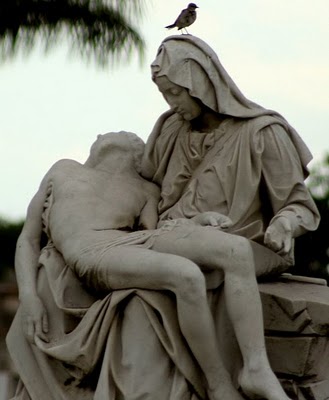

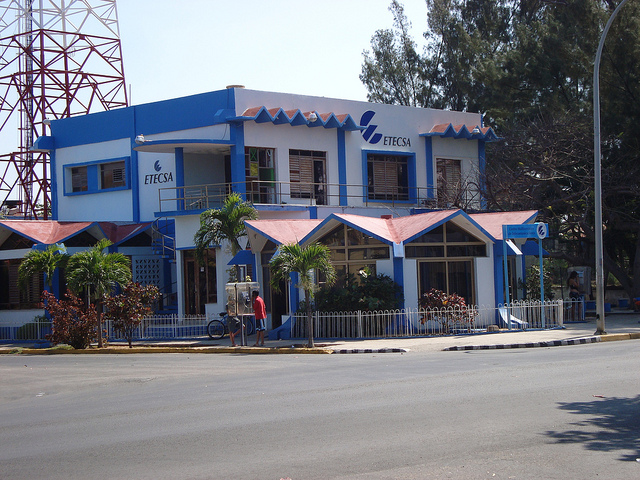
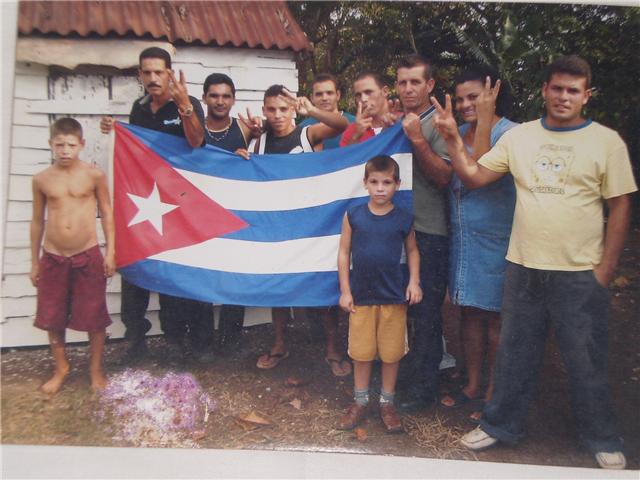
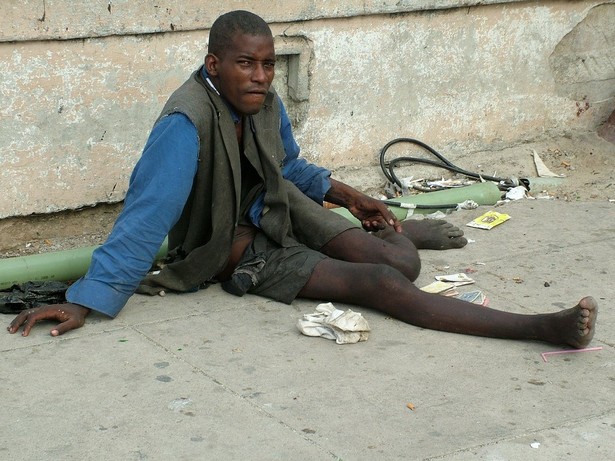
 Photos: Francis Sánchez
Photos: Francis Sánchez The cardinal, in January’s Mass that dealt with the message from Pope Benedict XVI with which he opened a new year — “Religious Freedom: Road to Peace” — when even the period the government had given to itself had expired, gave a review of the ideas of some liberties with names, and showed himself to be excited by the results of the mediation of the Church and in particular by his own role. The magazine “New Word“, by the Archdiocese of Havana, described his speech: it said “[he] has a ‘moral certitude’ that in the next few months other prisoners ‘sanctioned for some type of event connected with political postures or actions’ would be set free”. In addition, by the way, he invited his listeners to “free your hearts of old throwbacks and, feeling yourselves to truly be free, assume a vision in reconciliatory truth among all Cubans.”
The cardinal, in January’s Mass that dealt with the message from Pope Benedict XVI with which he opened a new year — “Religious Freedom: Road to Peace” — when even the period the government had given to itself had expired, gave a review of the ideas of some liberties with names, and showed himself to be excited by the results of the mediation of the Church and in particular by his own role. The magazine “New Word“, by the Archdiocese of Havana, described his speech: it said “[he] has a ‘moral certitude’ that in the next few months other prisoners ‘sanctioned for some type of event connected with political postures or actions’ would be set free”. In addition, by the way, he invited his listeners to “free your hearts of old throwbacks and, feeling yourselves to truly be free, assume a vision in reconciliatory truth among all Cubans.”
 (Published in Cuba Daily, www.ddcuba.com, 28 January 2011)
(Published in Cuba Daily, www.ddcuba.com, 28 January 2011)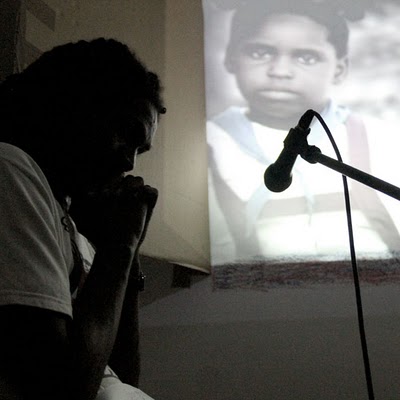
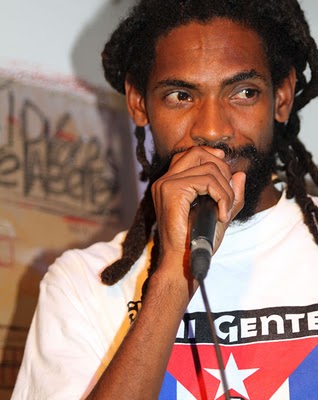
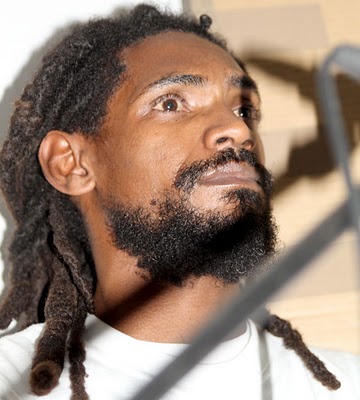
 A few days ago, in the hairdresser’s, the woman who went ahead of me started to chat with me while she waited for them to finish cutting the person’s hair ahead of her. In the conversation she told me about her daughter who “was advanced enough”; she said that while she softly brushed her fingers on her other forearm to refer to the color of her skin. “Why ‘advanced’, señora?”, I interrupted. “Do you consider that being black or belonging to your race is a setback?”
A few days ago, in the hairdresser’s, the woman who went ahead of me started to chat with me while she waited for them to finish cutting the person’s hair ahead of her. In the conversation she told me about her daughter who “was advanced enough”; she said that while she softly brushed her fingers on her other forearm to refer to the color of her skin. “Why ‘advanced’, señora?”, I interrupted. “Do you consider that being black or belonging to your race is a setback?”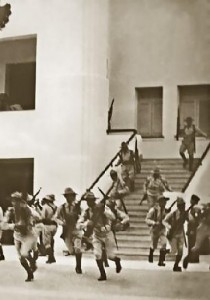 Since the last week of December, the Cuban news media turned the propaganda time chart on the 52nd anniversary of the Revolution, whose reviled founders stayed in power and in the disgust of the population, submerged in silence and the routine of a half-century of slogans and promises.
Since the last week of December, the Cuban news media turned the propaganda time chart on the 52nd anniversary of the Revolution, whose reviled founders stayed in power and in the disgust of the population, submerged in silence and the routine of a half-century of slogans and promises.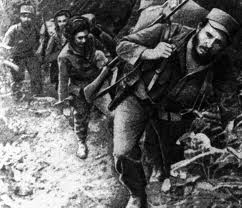 To assault the barracks in the eastern zone of the country, the participants bought arms, practiced marksmanship in various places around Havana and crossed the island, besides risking the lives of people who were enjoying the Carnival in Santiago de Cuba, killing dozens of soldiers and exposing their own men. The failure complemented the adventure, but it is worth asking: What would have happened if they had taken it? If the idea was to climb the mountains, why didn’t they just do that?
To assault the barracks in the eastern zone of the country, the participants bought arms, practiced marksmanship in various places around Havana and crossed the island, besides risking the lives of people who were enjoying the Carnival in Santiago de Cuba, killing dozens of soldiers and exposing their own men. The failure complemented the adventure, but it is worth asking: What would have happened if they had taken it? If the idea was to climb the mountains, why didn’t they just do that?